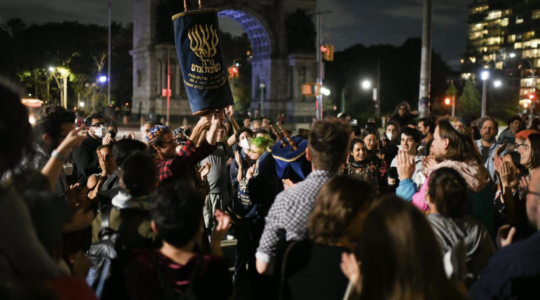Jewish organizations are turning their attention to Austria following agreement last week on how to divide a $5.2 billion German fund to compensate Nazi-era laborers and those whose bank accounts, insurance policies and property were stolen by the Nazis.
“It’s 60 years too late, but it brings a measure of justice,” said Elan Steinberg, executive director of the World Jewish Congress, of the German settlement.
Gideon Taylor, executive vice president of the Conference on Jewish Material Claims Against Germany and Austria, pointed out that the German parliament, or Budestag, must approve the arrangement.
He said Jewish groups want the legislation to spell out precisely how the money will be divided. Taylor hoped it would be done before the Budestag’s summer recess so that the first payments could be mailed by the end of the year.
The German government and German industry are equally financing the fund.
Taylor said that in dividing the money, negotiators estimated that about 120,000 slave laborers would apply, about 40,000 of them Jewish. Each is to receive about $7,500.
In addition, he said there are about 1 million forced laborers, few of whom are Jewish. Those who apply are each to receive about $2,500 because they worked under much less harsh conditions.
As much as $300 million will be available to pay insurance claims, and about $100 million to pay other claims, including those against banks.
Claims against insurance companies in other countries must still be resolved, Taylor said, and the Swiss bank settlement was still awaiting a judge’s approval.
He said efforts would be directed at resolving Holocaust-era claims against Austria. The Austrian government wants to resolve slave and forced labor claims first, Taylor said, before moving on to discuss Holocaust-era property issues.
“We believe it is crucial that Austria deal with these issues still remaining,” he said.
Austrian Vice Chancellor Susanne Riess-Passer has told The Jewish Week that all other outstanding claims would be resolved once the slave and forced labor claims are settled. Among the claims are compensation for 70,000 apartments and 35,000 businesses seized from Jews. A 1953 U.S. State Department document said the Austrians under a 1938 decree seized $1 billion in Jewish assets — $10 billion in today’s valuation.
Maria Schaumayer, appointed by the Austrian government to handle slave and forced labor claims, and Deputy Treasury Secretary Stuart Eizenstat, U.S. emissary for the talks, met in Washington last month to discuss the issues. There have been no government talks with Jewish groups since the rightist Freedom Party helped to form a coalition government in Austria earlier this year. But Jewish leaders said there are other ways to negotiate, such as through a third party, and that such efforts would be pursued.
A settlement in the Austrian talks would be welcome news to Isle Loeb of Monroe Township, N.J., who said she is seeking compensation for her family’s business, Vienna apartment and her father’s life insurance. “I have proof of all three,” she said.
Loeb said she, an older brother who went to the U.S. in 1939 and three cousins were the only members of her family to survive the Holocaust.
“My parents died in the Belzec concentration camp,” she said. “My father’s brother was taken to the camp in 1941, but because they needed my father to make counterfeit English pounds, he was not sent until 1942. They wanted all of Vienna to be Judenrein [free of Jews], no matter how good you were.”
Loeb said her parents sent her to Holland right after Kristallnacht in November 1938, when Jewish-owned stores and synagogues were looted and firebombed. Before that, she said her family had been ordered with other Jews to leave their apartments.
“We had to leave in five minutes,” said Loeb, who was 13 at the time. “My father had to ask permission a few days later to go back and get our belongings. Finally they said yes, and we all went back while three men watched what we took. On the night table was my mother’s gold watch with a chain and I took that. I gave the watch to a friend; I still have the chain.”
She said she has her father’s life insurance policy. Loeb said also that claims she has filed with the Austrian government for the money and her family’s apartment and business have gone unanswered.
Taylor said that even before last week’s talks were held, there were hints that a deal might be reached, about a year after talks began. Upon hearing that, Taylor said, he decided to fly to Berlin for the negotiations.
“We were very anxious to make sure that there be an adequate amount for Jewish slave laborers,” he said. “We ended up with Jewish slave and forced laborers getting close to $1 billion.
“We would not have gotten that figure based on the initial figures because the East European governments wanted larger amounts for forced laborers. We were quite far apart and discussions were rather tense in the weeks leading up to the final meeting. But we felt it important that Jewish slave laborers be protected. For us, that was an absolute and we stood very firm, despite huge pressures.”
Taylor stressed that that the money is “inadequate and only symbolic.”
“We just wanted to get the best agreement we could to protect the interests of Jewish slave laborers,” he said, “but we fully understand that nothing will compensate them for what they went through.”
Reparations Focus Turns To Austria
Jewish organizations are turning their attention to Austria following agreement last week on how to divide a $5.2 billion German fund to compensate Nazi-era laborers and those whose bank accounts, insurance policies and property were stolen by the Nazis. “It’s 60 years too late, but it brings a measure of justice,” said Elan Steinberg, executive […]
Advertisement




